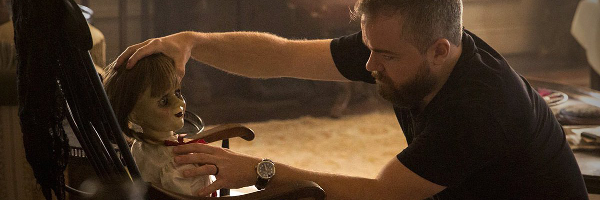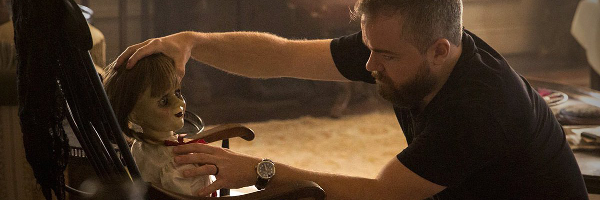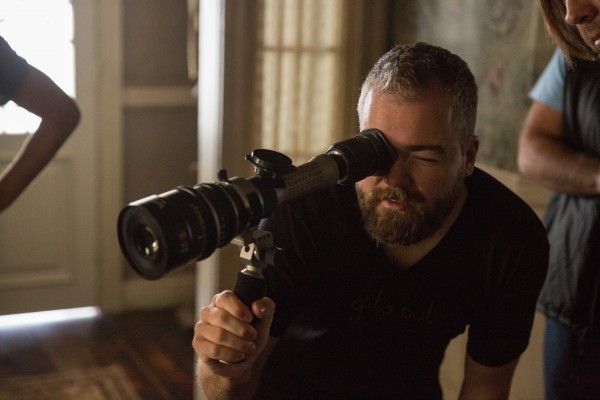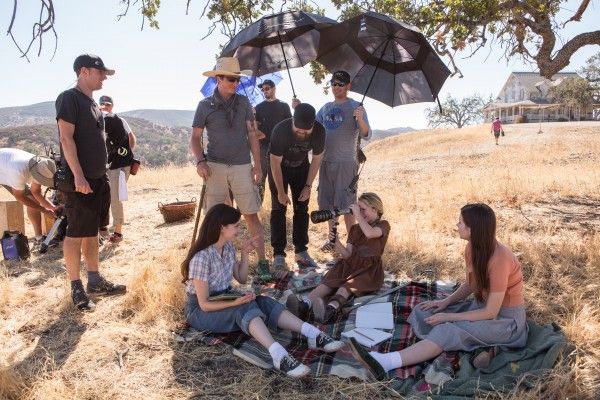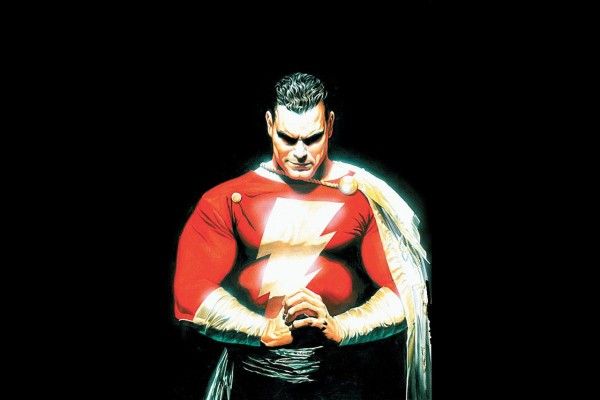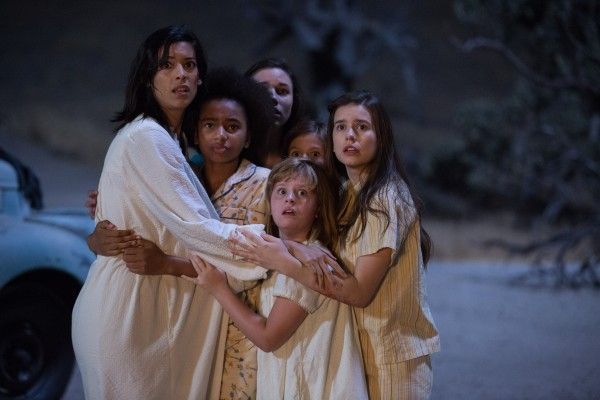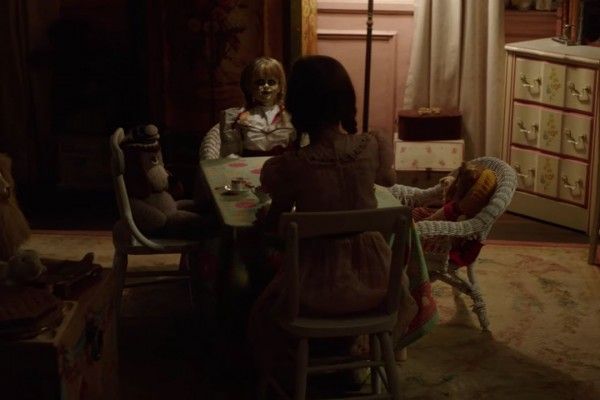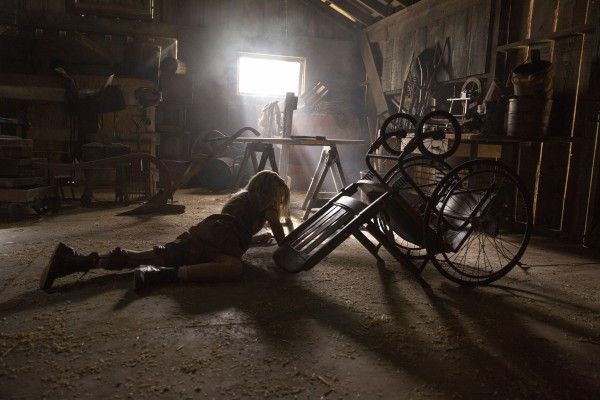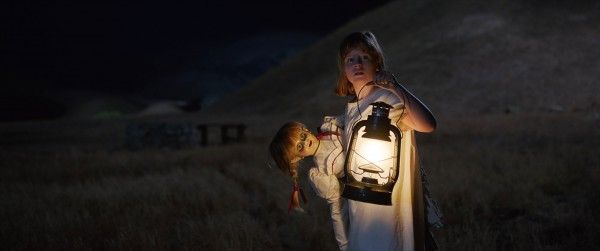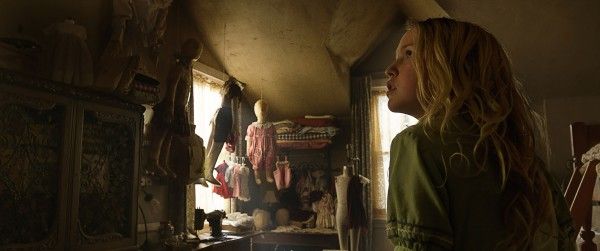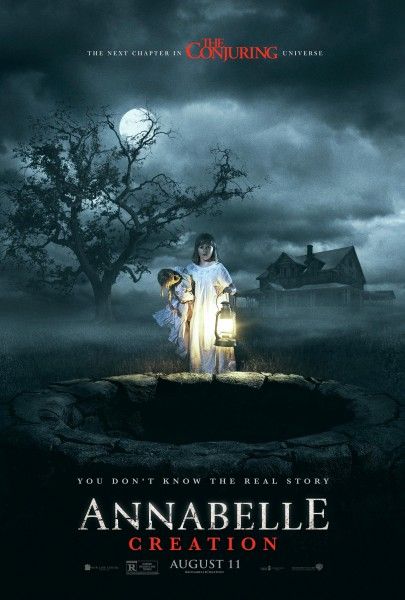The Conjuring universe is having a bit of a moment. It started with something of an anomaly in the studio horror landscape at the time. James Wan's first film was an R-rated original horror film aimed at adults. And it was a huge success. Next came the spin-off. Annabelle, then Wan's sequel, The Conjuring 2, which spawned two new spinoffs in its own right with The Nun and The Crooked Man. With their horror universe on the rise, Warner Bros. and New Line dropped their spinoff sequel Annabelle: Creation earlier this month, and once again, they have a huge hit on their hands.
For the origin story of their demonic doll, Wan and the studio recruited David F. Sandberg, the director who broke out in the feature filmmaking scene just last year with his critical and commercial hit Lights Out. Adapted from an original short film and produced by Wan, Lights Out reaped more than ten times its low, low budget, earned widespread critical acclaim, and established Sandberg as a filmmaker to watch. And Annabelle: Creation, which has already earned ten times its budget in only two weeks at the box office, cements that status. Sandberg knows he's on a roll and he's riding it to a blockbuster superhero project. Next up, the director will stay in the family at Warner Bros., but he's leaving horror behind for a minute to take on the film adaptation of the DC Comic Shazam!.
With Annabelle: Creation currently in theaters and tearing it up at the box office, I jumped on the phone with Sandberg earlier this week to talk about his horror hit and taking things in an entirely different direction with his next film. We also talked about why he wants to keep working with cinematographer Maxime Alexandre, how he approached the shared Conjuring mythology, what he learned on his first two films that made him the right director for Shazam, and why he definitely won't be digitally de-aging his superhero. Check out what he had to say in the interview below.
You started with an original film, so coming into a franchise like this, how much work did you guys put down at the beginning talking about the roles of your shared world and making sure the mythology lines up?
SANDBERG: Not that much. The sort of clear rules of Annabelle is just, about herself, is that we can't see her move. She doesn't walk around. Other than that, it was pretty free because it's such a different story and new characters. And James, he wants to make sure that we have these sort of little Easter eggs, like for The Nun, and that we had the same demon from the first Annabelle so it ties the universe together. But other than that, there wasn't a lot rules to speak to.
And I assume Corin Hardy shot that Nun tag from his set and then sent that over to you, or did you film that?
SANDBERG: The very thing at the end was stuff that Corin shot, yeah, for his movie. But we also had the little photo and the Bible and stuff like that so.
This Conjuring universe seems to just be growing more and introducing new characters pretty quickly. Would you want to take on another demon from this universe?
SANDBERG: I don't know. For now, I feel completely satisfied just having done this. My installment in this universe was quite an honor, but there's no immediate need to try and do more with it for me personally, no.
On a broader scale, you came in, you double-whammied with two hit horror movies, so you're kind of known as a horror guy now. Is that what you want to do primarily or are you excited to explore other genres?Â
SANDBERG: Yeah, I mean my next movie is not a horror movie. It is a superhero movie, which are the two kinds of movies being made now. But I mean, I've always loved horror so I think I'll definitely return to that genre in some ways. But it's always good to try something different for Shazam.
You've worked with James Wan on these last two films, and it's funny because he had a somewhat similar path in that came into the industry with really profitable horror movies and then moved up to the bigger budget action epics. Has he offered you any guidance or hot tips as you navigate the process?Â
SANDBERG: No, I actually haven't talked to him since I got the job to do Shazam. Cause he's in Australia shooting Aquaman and all that. I think horror... There's sort of a trend almost of giving these bigger movies to horror directors and I think that horror is quite a hard genre to master so I think if you can do horror you can pretty much take on a lot of other things. It's technically challenging to get right.
You're right it is a trend right now, especially in superhero films, but I've always been fascinated by how many filmmakers will start in horror and go on to become one of the preeminent filmmakers in the industry. Â
SANDBERG:Â Yeah. So hopefully I'm on that path. [Laughs]
What do you think you learned from working on your first two films in horror that's maybe made you the right guy to take on Shazam at this time?Â
SANDBERG: Well I mean overall, I've been working with kids in both my movies to my success and there will be kids in Shazam and the main character is this kid who becomes an adult. But otherwise I think, I mean my first movie was just a huge learning experience in that, I'd only made no-to-low-budget shorts before back home in Sweden and all of a sudden, I got to go to film fests in America and I got to be the director. There was a lot to learn on that movie. Just how movies are made here. How things work. And then on Annabelle, there was a lot more sort of... I was lot more relaxed and could have a little bit more fun and just try out some different things, like a little bit of a different shooting style and stuff like that that I really enjoyed and I want to try to keep.
It's funny that you mention the kids. We were talking in the work chat this morning if you would work with child actors or for some reason try to digitally de-age the adult actor.
SANDBERG: Yeah, I wouldn't want to do that. That seems like way too much of a hassle. So I think it's just kind of best to have a kid and an adult.
Right. It's that weird trend that's going around right now though, they want to digitally de-age everybody.Â
SANDBERG: Yeah and they've done quite well, I mean Kurt Russell was in the latest Guardians was really well made I thought, but I think there's a limit to it as well. You probably can't do someone to be a kid. Why create that hassle for yourself?
Yeah well, I'm glad to hear it. When we were talking about it, I was like "Oh my god, that would be horrifying". [Laughs]  Jumping back to why I'm talking with you today, When you look at the horror industry this year, the things that are connecting with audiences this year aren't especially predictable or in the same vein as each other. Get Out is very different from Split is very different from Annabelle...Â
SANDBERG:Â Yeah.
Why do you think all these different voices are being fostered through studios and not just the independent side of things?
SANDBERG: I think that's the advantage of horror is that you can make them so cheaply. I think more people are willing to take risks or do something different, which is why you see experimentation like that in horror. When we have 100 million dollars are we gonna be like "Aaah let's not do anything too crazy", but 5 million dollars, that's not a lot for a studio. So it's like "Yeah let's try somethings different" and if it works we get a very good return on investment.
You had a somewhat significant jump up in budget between Lights Out and Annabelle, right?
SANDBERG:Â Lights out was 5 million and Annabelle was 15. To me, 15 felt very comfortable, it's like "Oh there's so many days and so many cool toys," but in Hollywood 15 is still very low budget in the studio system. But yeah, it was a big jump for me but it's not a giant leap in Hollywood.
Right. How did that affect you as a filmmaker on set though? Some filmmakers get more budget and they suddenly find they have more things to worry about and less creative control, while obviously a lot of filmmakers love the new big budget. How did you take to 10 extra million?
SANDBERG: For me it was all positive. Because first of all, doing anything was gonna be easier than doing Lights Out, just because everything was new, but I just love the opportunities it created. We were able to build this house from scratch. This she was on a salvage stage this was my dream to do because you get to design the whole house however you wanted to and then when you're shooting you don't have to be careful, you can "Yeah, I want a hole in this wall, I want to crush this thing" or whatever you want to do.
I watched your video series about directing Annabelle. What was the motivation there, because you don't really get to see that kind of insight a lot.You know, the studios will release the B-roll, but they remove the audio.
SANDBERG: That's why I wanted to do it because I've always wanted to see how directors direct movies and what it's like on film sets. That's just me giving other people like me what I would have wanted. I just want to share my experience and what little I know about things.
You've talked about how Lights Out was crazy because you were literally learning everything. When you came into your second film was there something you learned this time around that you weresurprised you didn't learn on your first feature?
SANDBERG: I don't know. I didn't plan this movie out as much as I did Lights Out because I thought I was so insecure, like I didn't know what to expect and I wanted to make sure it was good movie so I would get another chance. So, I did so many story boards and shot lists and everything like that. On Annabelle I was like -- cause on Lights Out, you'd run out of time or learn the difficulties or whatever and you couldn't shoot the way you'd story boarded it. But on Annabelle but I was like "I'm not gonna tie-on as much. I'll just figure it out with the DP and the cast, and we'll improvise a little bit more." And I found that that actually worked really well. And it was an enjoyable way to work. That might change a little bit for Shazam, I'm sure there will be a lot of pre-vis and magic to stick to and a little less improvising on set.
Well that kind of ties into something I wanted to ask you. How do you approach like scare set-pieces and do you find that you're taking a different approach to how your conceivingaction set-pieces, or does it feel similar?
SANDBERG: I suspect that they might be a little similar. What I enjoyed the most on Lights Out was when we got into a little bit more action stuff. I had some stunts on wires and stuff like that, but I think my approach when it comes to scares I try to use as much tension as possible before so it's not just like a jump scare out of nowhere, but it actually builds towards it, to have the characters go through bigger and bigger ordeals and stretch out that moment of tension as much as you can. But yeah, it'll be interesting to see what it's like when it's more action than scares.
Do you have some time to sort of relax and celebrate your victory with Annabelle or are you pretty much rolling right into production?
SANDBERG: Pretty much going into Shazam right away. I mean my life's just become so weird because I got to do Lights Out and immediately afterward I got to do Annabelle and now I'm going straight into Shazam, so it's like I'm on a roll so let's just keep going until they kick me out of Hollywood.
When do you start filming?
SANDBERG: Yeah, I don't know if it's official.
Gotcha.
SANDBERG:Â It's coming up.
With your first two films, you've worked with different DPs. Are you enjoying that and are you continuing that trend with Shazam?
SANDBERG: I really enjoyed working with Maxime Alexandre on Annabelle: Creation so yeah, I want to work together with him as much as I can, because we got along great and we share similar sensibilities when it comes to cinematography.
He shoots beautiful movies. Just so I don't report this wrong, are you saying that he is on Shazam or that you're looking to work with him generally?
SANDBERG:Â I want to try and work with him on everything that ever comes up.
I don't blame you. His work on The Hills Have Eyes is some of my favorite horror cinematography from that era.
SANDBERG: Yeah. That's something he showed me on that one how he shot some of the windows, the blown-out sort of textured windows. That movie was what he emulated, which we did again in Annabelle: Creation because it is that sort of desert environment and it's shot on studio so you don't want to see a bunch stuff outside the window anyway, so you just overexpose it and make it look really hot.
Yeah, I love the look of that movie. And Maniac too. Annabelle looked beautiful as well, but on the other side of the visual dynamic, do you enjoy the creature creation side of these things? Like the demon [in Annabelle]and, of course, in Lights Out, Diana had such a fantastic look.
SANDBERG: I do love when he sort of shows demons. Sometimes it's like "Oh maybe we're showing too much here," but it is a fine balance. I think it's scary when you don't know exactly what you're dealing with but at the same time you're scared of leaving people disappointed if they don't at least get a peek at the monster, you know? There's a fine balance.
Annabelle: Creation is now playing in theaters.
(Note: This interview has been edited and condensed for clarity)

